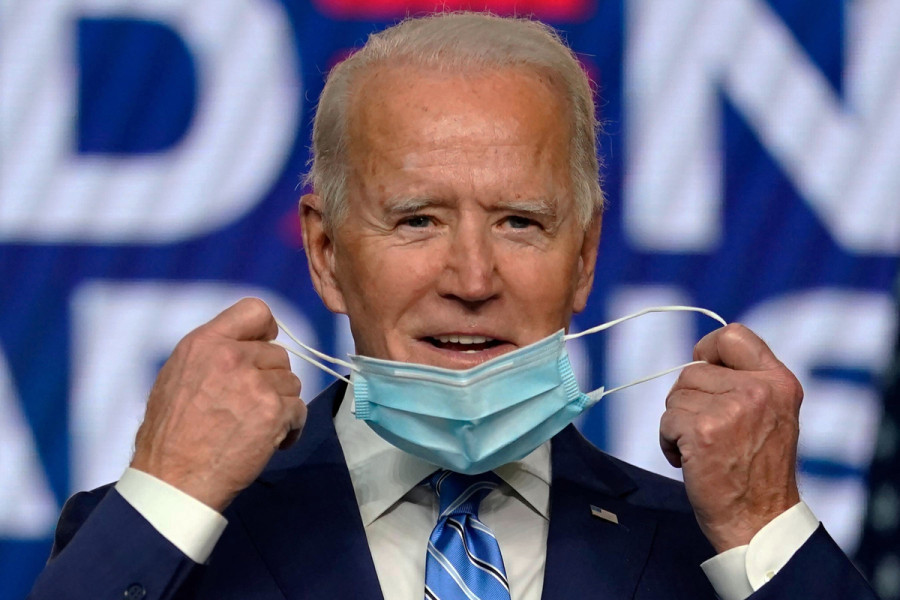Columns
Biden’s won. What next?
Despite the sense of relief at Biden’s victory, the underlying sources of tensions that dominated the world before the election will continue to persist.
Amish Raj Mulmi
A palpable sense of relief has overtaken the world with the election of Joe Biden as the new American President. There is a belief that the Donald Trump presidency was an aberration, and that under Biden the US can rightfully regain what it had lost in the four years since 2016. Trump’s disorderly foreign policy has made the world lose trust in multilateralism and American leadership, and coupled with a domestic policy based on exclusion and white majoritarianism, Trump’s America, many hope, has been consigned to the bin. Biden’s calls to rejoin the Paris Agreement has encouraged those who believe that mitigating climate change has to be the number one goal for any ruler in the 21st century.
Without a doubt, the ejection of Trump from the White House is a refreshing moment. For four years, the US presidency had become a whimsical position that derived its power from the self-absorbed social media outbursts of Trump. The world let out a sigh when various American media outlets called the election in favour of Biden. But how much of a change does the 78-year-old represent, and how far will he deliver on the many commitments he made during his campaign? And will the contours of a rapidly changing world be arrested under his presidency for the US?
While the first two queries are mostly for the American population to ponder upon, the last question has been analysed by several both here in Nepal and across the world. A few recent columns in this paper have both focused on the question of what the Biden win means for Nepal. While one thought the Biden administration will focus on South Asia and an alliance with India to counter China’s rise, the other argued since the Trump administration had no ‘coherent’ Nepal policy, whatever Biden does will be a change ‘for the better or the worse’. Both positions are valid.
American foreign policy displays a remarkable continuity despite a change in administration, and arresting China’s rise will remain a priority for the White House no matter who sits in the Oval Office. On the other side, Beijing seems to agree. ‘Any Chinese rapprochement with America should be understood for what it is: a bid to buy time while China races to become stronger’. The US may seek to bring India in a global multilateral alliance to contain China, but the Narendra Modi government will not be too pleased with Biden’s calls on Kashmir and the Citizenship Amendment Act. Further, in the recent past, New Delhi has found it easier to work with Republican governments than with Democrats, as witnessed by the bonhomie between Trump and Modi (Ab ki baar, Trump sarkar) that certainly seemed more comfortable than the relationship Modi had with Barack Obama, and the Indo-US nuclear deal under Manmohan Singh and George W Bush.
Despite the sense of relief at Trump’s ejection, what is clear is that the underlying sources of tensions that dominated the world before Biden’s election will continue to persist. Biden rode to power on an unprecedented minority voter mobilisation, but the racial divide between whites and the rest is a clear warning sign that the priorities of the respective groups are different. How will the systemic inequality be addressed without antagonising the majority community? And it’s not just in the US; inequality—whether in income or in representation—will rise across the world.
One does not expect Biden to adopt as tough a position as Bernie Sanders on climate change and on US commitments for mitigating greenhouse gas emissions, especially given the challenges of post-Covid-19 economic recovery. A course correction from the Trump tilt towards unilateralism also seems unlikely; rather, with the security pivot now fully turned towards Asia, Washington will try to see off China’s rise with the help of other nation-states who have their own axe to grind with Beijing even as it reduces its multilateral commitments.
Biden will not be entirely to blame if his presidency is not radical enough to tackle the challenges of the 21st century. For, we are all living through a historical moment that is not only seeing a churn in the power equations of nation-states, but also a radical departure from the way, say, our parents lived. In that, we are at a moment in time not too different from the beginning of the 19th century, when revolutions in transportation, communications, energy etc. radically transformed the values that shape our world. One example is data. There has never been more data in the entire history of mankind than today, which means governments, corporations, even the average individual, knows a lot more about others than at any time in the past, which brings different opportunities as well as threats.
The key takeaway from the US election—and the recently concluded Bihar State Assembly election—is that the democratic process still holds value, and that voters can be swayed to place their trust in younger leaders like Alexandria Ocasio-Cortez and Tejashwi Yadav (young by non-Nepali standards, that is). The radical transformations of the 21st century can only be heeded by a leadership that is more clued in with ground realities and the aspirations of the younger generation. Older leaders may be acquainted with these desires, but any ideological high ground they may have once hitched themselves to will have been swayed by corporate promises and self-interests.
It is perhaps time to moor our ideologies once more to justice, equality, and, this time, to sustainability as well. We need leaders who can acknowledge societies aren’t perfect, but do not make perfection itself a goal. We need intellectual honesty in different spheres of life. And finally, we need to look back at history, not as an inspiration for ethnonationalism, but as a warning to heed the signs past rulers didn’t.
***
What do you think?
Dear reader, we’d like to hear from you. We regularly publish letters to the editor on contemporary issues or direct responses to something the Post has recently published. Please send your letters to [email protected] with "Letter to the Editor" in the subject line. Please include your name, location, and a contact address so one of our editors can reach out to you.




 9.89°C Kathmandu
9.89°C Kathmandu















